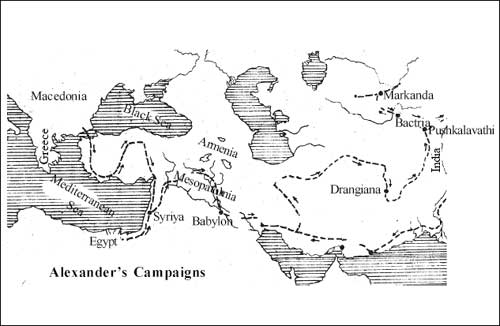Political Condition on the eve of Alexander’s Invasion
After two centuries of the Persian invasion, Alexander from Macedonia invaded India. On the eve of his invasion, there were a number of small kingdoms in northwestern India. The leading kings were Ambhi of Taxila, the ruler of Abhisara and Porus who ruled the region between the rivers of Jhelum and Chenab. There were many republican states like Nysa. In short, the northwestern India remained the most disunited part of India and the rulers were fighting with one another. They never come together against common enemy. Yet, it was not easy for Alexander to overcome so many sources of opposition.
Causes of the Invasion
 |
| Alexander |

Battle of Hydaspes
In 327 B.C. Alexander crossed the Hindukush Mountains and spent nearly ten months in fighting with the tribes. He crossed the Indus in February 326 B.C. with the help of the bridge of boats. He was warmly received by Ambhi, the ruler of Taxila. From there Alexander sent a message to Porus to submit. But Porus refused and decided to fight against Alexander. Then Alexander marched from Taxila to the banks of the river Hydaspes (Jhelum). On the other side of the river he saw the vast army of Porus. As there were heavy floods in the river, Alexander was not able to cross it. After a few days, he crossed the river and the famous battle of Hydaspes was fought on the plains of Karri. It was a well-contested battle. Although Porus had a strong army, he lost the battle. Alexander was impressed by the courage and heroism of this Indian prince, treated him generously and reinstated him on his throne.
